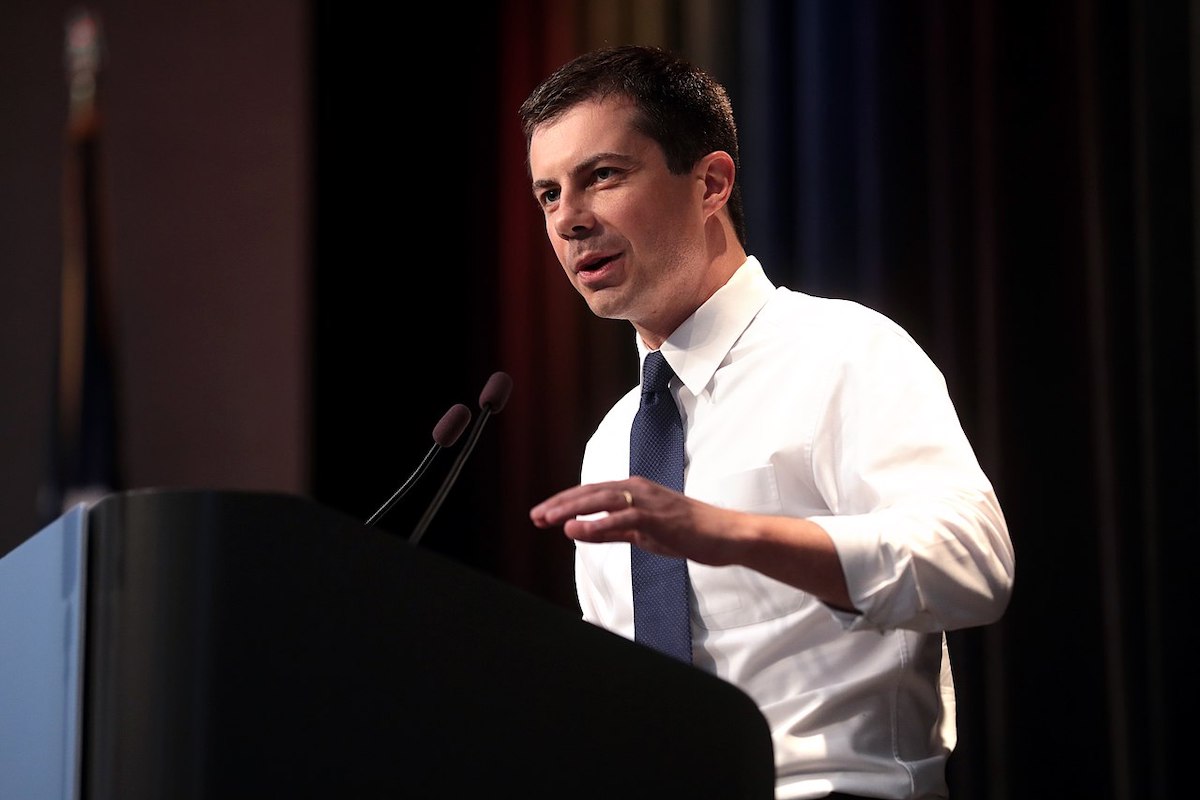

Mayor Pete Buttigieg speaking with attendees at the 2019 Iowa Federation of Labor Convention hosted by the AFL-CIO at the Prairie Meadows Hotel in Altoona, Iowa. (Photo by Gage Skidmore/CREDIT)
After two weeks of being in the news for the wrong reasons, Pete Buttigieg’s campaign published a white paper titled “El Pueblo Unido/A People United: A New Era for Latinos” that outlines how his presidency would tackle some of the significant issues faced by the Latino community.
While the document is worth a read —Latino Rebels founder Julio Ricardo Varela published a quick explainer— I want to talk about the Puerto Rico proposals that are mentioned and what they tell us about his campaign.
The island is first mentioned as part of his plan to create a Disaster Preparedness Commission in his first 100 days that would pay “particular attention to islands and coastal regions, including Florida and Puerto Rico.” That sentence is part of a broader disaster preparedness plan he crafted that seems to have done an excellent job of compiling the failures of the federal government’s response to Hurricane María and coming up with common-sense solutions. More campaigns need this in their platforms, like right now.
Another sensible policy proposal made by the campaign is that Buttigieg would work to eliminate the Medicaid funding disparities of the island. To request Medicaid funding parity for Puerto Rico is not only the right thing to do, it’s also the smart thing to do. The mayor has been feeling some heat since details about his work for the McKinsey consulting firm were made public. One of the main points of focus has been specifically about his role in “identifying savings in administration costs” for Blue Cross Blue Shield in Michigan—a company that then proceeded to hike insurance premiums and fire hundreds of employees.
But what does that have to do with Puerto Rico?
Well, it just so happens that Puerto Rico’s Financial Oversight and Management Board (FOMB) employs McKinsey as its primary consulting firm and that the board has imposed deep cuts to the island’s healthcare system in the past three years. That is why it is such a smart and timely move by the campaign to include that proposal. In one swoop Buttigieg addresses his position on Puerto Rico’s looming Medicaid funding cliff and starts to repair some of the McKinsey damage incurred by his campaign. I’m not saying he only did it because of McKinsey, but isn’t it great when you can solve two problems with one proposal?
Don’t get me wrong, all campaigns need to include this in their platform as well. However, I still have some questions about how cozy his relationship is with the people that advise the FOMB to cut pensions, reduce healthcare funding, close schools, and hike energy prices. I also have some questions about the feasibility of his third Puerto Rico-related proposal.
Mayor Pete calls for providing “immediate political representation to Puerto Rico in the Electoral
College.” It may seem like a wholly feasible and logical proposal. Still, then we have to remember that a constitutional amendment is needed in order for the residents of Puerto Rico to be extended that right. That means that it has to pass both the House and the Senate with the approval of three-fourths of the members and then be ratified by 38 states.
To think that in today’s extremely polarized politics, Buttigieg will be able to “immediately” extend the presidential vote to Puerto Ricans makes me question how truly divorced from Puerto Rico’s reality he is. I don’t think GOP-controlled legislatures will be running to ratify an amendment to give Puerto Ricans that right. Don’t believe me? Just ask supporters of the Equal Rights Amendment, or the Child Labor Amendment.
The amendment process and our political polarization make it too hard for his proposal to be executed immediately, while a change in status only needs to be passed into law. That’s just the political reality of our time, and of understanding how the system works.
So, where does this leave Mayor Pete? I think it is refreshing that campaigns are finally starting to publish proposals that are specific to the Latino and Puerto Rican communities. In fact, the only reason I can critique his plan is that, unlike most other campaigns for President, he actually published something about Puerto Rico, and we have to give him kudos for that.
However, I’m still worried about how much research goes into these proposals, and if campaigns are only talking to “community leaders” and not engaging subject-matter experts.
Because any Puerto Rican worth their salt would’ve told Buttigieg that solving Puerto Rico’s status is more feasible than getting the island into the Electoral College. And that promising Puerto Ricans that he will immediately get us the presidential vote would alert us that he is not doing his homework.
***
Frederick Vélez III Burgos is a former Congressional staff member and has worked in the last three election cycles to get out the vote in the Latino community. Born and raised in Trujillo Alto, Puerto Rico, he now lives in Miami, FL. You can follow him on Twitter at @frederickviii.


